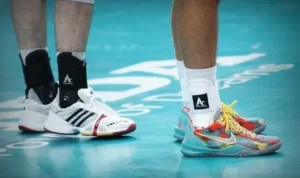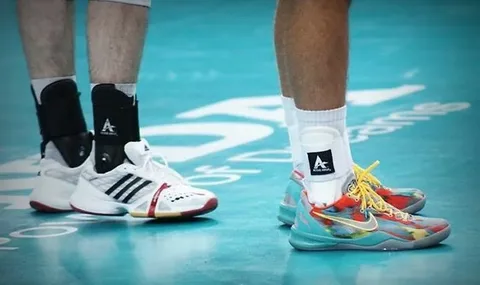Can you use on shoes for volleyball-A Complete Guide on Choosing the Right Footwear

In the world of volleyball, you might think any comfortable shoes will work, right? After all, if you already have a pair of cushy running shoes, why spend on another pair? But when it comes to fast footwork, quick pivots, and high jumps, can you use running shoes for volleyball without risking your game (or worse, an injury)? Well, the answer isn’t as simple as it sounds. The structure and design of your footwear can make a huge difference in your performance on the court. Let’s dive into the key factors that matter when choosing shoes for volleyball.
Can You Use Running Shoes for Volleyball? Let’s Explore
Before you make a decision, let’s look at the differences between running shoes and volleyball shoes. Sure, both provide cushioning and support, but the requirements for each sport vary.
1. Running Shoes vs. Volleyball Shoes: What’s the Difference?
Running shoes are engineered for forward motion, providing support for repetitive steps and shock absorption for each stride. Volleyball, on the other hand, requires lateral movement, quick stops, and high jumps. Here’s a breakdown of what makes each unique:
Running Shoes:
Made for forward movement
Typically lightweight
Good for shock absorption but limited lateral support
Volleyball Shoes:
Designed for quick lateral movement and grip
Enhanced ankle support and stability
Specifically built for impact absorption during jumps
These differences may seem subtle, but they can significantly affect your play on the court. Using running shoes for volleyball might lead to a lack of traction and increase your risk of injury.
Why Not Just Use Running Shoes for Volleyball?
If you’re asking, can you use running shoes for volleyball, let’s go deeper into the potential risks and drawbacks. Running shoes may give you the comfort you want, but they don’t provide the stability and grip essential for volleyball.
2. Risk of Injury
Running shoes don’t offer the lateral support volleyball demands. When you’re lunging to make a dig or blocking at the net, this lack of support can lead to ankle sprains or strains. Volleyball shoes are designed to help prevent these injuries by providing stability and proper traction.
3. Reduced Performance
Volleyball involves quick pivots, side-to-side movements, and high jumps—all of which require excellent traction. Running shoes, designed for straight-line motion, don’t grip the court like volleyball shoes do. This difference may reduce your performance and agility during the game.
4. Foot Fatigue
Running shoes are lightweight and cushioned, but they lack the specific padding in the right areas for volleyball. Volleyball shoes are built to absorb impact from repetitive jumping, so if you’re wearing running shoes, you might experience foot fatigue faster than expected.
When Can You Use Running Shoes for Volleyball?
There are some cases where you might be able to get away with using running shoes on the volleyball court. Let’s look at when that could be acceptable and some tips on how to make it work.
5. For Casual or Recreational Play
If you’re playing volleyball recreationally or at a beginner level, running shoes might suffice. However, as you advance, proper volleyball shoes become crucial.
6. Budget-Friendly Option
Sometimes, budget constraints make volleyball shoes a luxury. If you must use running shoes, opt for those with better grip, some lateral support, and a flat, non-slip sole to reduce your risk of injury.
What to Look for in Volleyball Shoes?
If you’re ready to get shoes that are more tailored to volleyball, here are key features to consider.
Traction: Volleyball shoes are designed with gum rubber soles that provide exceptional grip on indoor courts.
Cushioning: They’re engineered to absorb the repeated impact from jumping, which reduces strain on your joints.
Support: Volleyball shoes feature strong lateral support, which is essential for quick, multi-directional movements.
Weight: Light but durable, these shoes won’t weigh you down, enabling fast reactions on the court.
Benefits of Using Proper Volleyball Shoes
Now that we’ve gone through the “can you use running shoes for volleyball” debate, let’s highlight the benefits of opting for dedicated volleyball shoes.
Enhanced Performance: Volleyball shoes improve agility, allowing you to move faster and change direction easily.
Better Support: Designed for side-to-side movement, volleyball shoes help prevent injuries.
Durability on Court Surfaces: Volleyball shoes are made to withstand the specific wear and tear of court surfaces, so they last longer than running shoes when used for volleyball.
FAQs About Using Running Shoes for Volleyball
1. Can I wear running shoes if I’m just starting out in volleyball?
Yes, beginners can start with running shoes if they play casually. But as you progress, switching to volleyball shoes will help prevent injury and improve performance.
2. Will running shoes ruin the volleyball court?
Possibly. Running shoes have hard rubber soles that can leave scuff marks or fail to grip well. Volleyball shoes, by contrast, are designed with a non-marking, gum rubber sole that grips the floor without causing damage.
3. How can I make running shoes safer for volleyball?
If you must use running shoes, choose a pair with some lateral support and a flat, non-slip sole. Avoid shoes that are overly cushioned in the heel, as they might destabilize you during side-to-side movement.
4. Do professional volleyball players use running shoes?
No, professional players stick to volleyball-specific shoes. Their quick movements and high-impact jumps require the specialized support and cushioning these shoes provide.
Conclusion
So, can you use running shoes for volleyball? While it’s possible, especially for beginners or casual players, running shoes simply don’t provide the support, traction, and durability needed for serious volleyball. Opting for proper volleyball shoes can reduce your risk of injury, improve your agility, and make you feel more stable on the court. If you’re ready to take your game up a notch, investing in volleyball shoes might be the best step forward!
For those who want the best of both worlds, consider cross-training shoes as a temporary compromise, but remember: nothing beats footwear that’s made for the game you play.
